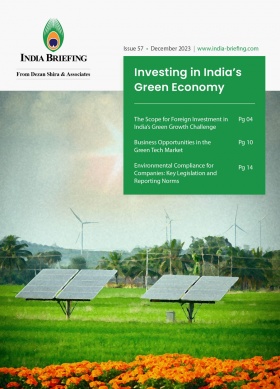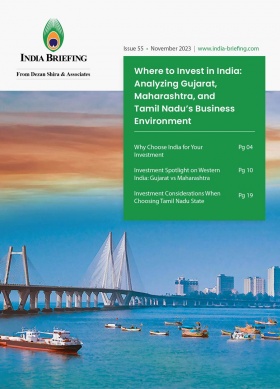The Draft Delhi Industrial & Economic Development Policy 2023–33
The Draft Delhi Industrial & Economic Development Policy 2023–33 lists eight focus sectors and multiple thrust areas to achieve high-tech and sustainable transformation in the city. Feedback to the policy white paper closed on December 31, 2023.
The Delhi government released a white paper on the ‘Industrial and Economic Development Policy 2023–33’ last year with the aim of establishing a knowledge-based economy through the development of high-tech industries and the services sector. The policy paper also envisioned the transformation of the national capital into a “24-hour city.”
Feedback on the white paper was open for submission from November 21 to December 31, 2023, from stakeholders.
Previously, in October last year, the Industries Department of Delhi introduced a startup policy with the aim of fostering the expansion of 15,000 startups by the year 2030, providing collateral-free loans and expert guidance.
Furthermore, the Delhi government is actively engaged in the development of the Shahdara district, known for its grain market, in alignment with the ‘District as Export Hub Scheme.’ This initiative entails the identification, branding, and promotion of a unique product from each district, emphasizing items with export potential.
Key goals
The proposed policy seeks to position Delhi as a globally competitive urban economy by fostering the night economy, promoting plug-and-play facilities, supporting startups, and encouraging new economic activities.
Key goals include:
- Maximizing human capital potential – attracting the best-in-class talent to the region and fostering entrepreneurship and innovation.
- Creating an innovative knowledge-based economy – institutionalizing the public-private partnership model for industrial and economic development.
- Developing a sustainable industrial hub – promoting environment-friendly industrialization, championing circular economy principles, and encouraging high-tech industrial and economic development.
- Fostering transformed ways of working – providing a simplified and easy way of doing business and proactively responding to emerging trends to accommodate changing industry landscapes.
- Cultivating collaboration and partnerships – ensuring policies are aligned to reduce business costs, promoting the integrated and flexible use of land, advocating for state-of-the-art, high-density infrastructure, and enhancing the relative scale of enterprises to compete on a global level.
- Startup focus – the Delhi Industrial and Economic Development Policy, in alignment with the city’s Startup Policy, aims to create a conducive, innovative, and supportive environment for startups through proactive, measurable initiatives.
- Ease of business setup – the Delhi government intends to promote the ‘Plug and Play’ model, particularly for high-tech clusters, MSMEs, and units in industrial areas across Delhi. In line with Ease of Doing Business recommendations, the Delhi State Industrial Infrastructure Development Corporation (DSIIDC) may allocate land for creating and facilitating plug-and-play options in the city’s industrial areas.
Night time economy
The white paper mentions that the concept of a ’24-hour city’ will be advanced through the implementation of the model shops and establishments (regulation of employment and conditions of services) Act 2015, along with the formulation of a comprehensive night-time economy policy. The strategy involves identifying nodes, precincts, or circuits for ongoing work, cultural activities, and entertainment at night, aiming to attract both tourists and locals. This approach is anticipated to enhance economic output by extending workspace utilization, ensuring city safety, and promoting a vibrant nightlife.
The night-time economy covers a blend of business, leisure, social, and cultural activities, including food, beverages, and entertainment-focused core activities such as restaurants, cafes, pubs, bars, theatres, festivals, markets, and live music.
As of December 2023, 83 more commercial establishments have received approval to operate 24/7, bringing the total to 607 in the city. These establishments include major food, retail and beauty brands, and received permission from the Chief Minister and labor minister, followed by approval from the office of the Lieutenant Governor. The exemptions for these establishments have been made under Sections 14, 15, and 16 of the Delhi Shops and Establishments Act, 1954, which enables commercial establishments to operate on a 24X7 basis.
Delhi Industrial & Economic Development Policy 2023–33: Focus sectors and thrust areas
Eight focus sectors have been identified by the Delhi government to focus on for the next 10 years to elevate the city’s industrial and economic capacities – manufacturing, information technology (IT), IT-enabled services (ITeS), higher education, transport, tourism and hospitality, retail and wholesale economic activity, and research and innovation.
The white paper lists brownfield and greenfield interventions for each of the focus sectors – see official document here.
Additionally, the white paper notes certain thrust areas to be promoted, which include environment and sustainability, labor welfare, women empowerment through providing accessible healthcare, education, and social provisions, startups, household industries, night time economy, and handicraft, handloom, and khadi.
Validity
The policy’s objectives will be executed with cross-cutting interventions to ensure integrated outcomes. The policy is slated to be operational for a decade following its notification.
Delhi Economic Activity Masterplan
The policy white paper discusses an Economic Activity Masterplan for Delhi and the laying down of a comprehensive and forward-looking strategy steer and catalyze economic growth and development throughout the Union Territory (UT).
|
Delhi Industrial and Economic Development Policy: Economic Activity Masterplan |
||
|
Global and national tradable sectors |
Enabling sectors |
Derivatives |
|
Manufacturing – Furniture – Food processing – MRO – High fashion – High-tech – Manufacturing |
Transportation and distribution – Warehouses – Multi-modal – Logistics Research and innovation |
Retail and wholesale Tourism and hospitality – MICE tourism |
|
IT and ITeS – AI and Big Data |
|
|
|
Medical and allied services |
|
|
|
Higher education |
|
|
The primary goal of this master plan is to map out in detail the economic landscape of the identified focus and allied sectors, along with other sector initiatives. This would utilize a GIS-based map with a layered architecture. The approach will facilitate the establishment of a dynamic database that includes existing and proposed facilities and stakeholders on a map, allowing for comprehensive cross-sectoral development.
This master plan will outline essential policies and interventions to achieve specific outcomes, including but not limited to job creation, enhanced productivity, increased competitiveness, and economic diversification. Incorporating key design principles such as strategic location selection, integrated ecosystem development, talent mapping, streamlined approval processes through a Single Window System, and a focus on improving the quality of life, the plan is designed to be a robust guide for sustainable economic development.
Furthermore, the master plan will conduct an in-depth analysis of the current economic situation, providing insights into critical opportunities, challenges, strengths, and weaknesses that must be addressed to achieve sustainable growth.
The economic development strategy for the UT will be divided into short, mid-term, and long-term goals. In the short to mid-term, the emphasis will be on optimal utilization of existing facilities and resources, advancing ongoing initiatives with a focus on value chain resilience. In contrast, the mid to long-term goals will prioritize new interventions, greenfield infrastructure developments, and integration into global value chains. This phased approach ensures a strategic and adaptable framework to guide the economic development of the Union Territory over the long term.
About Us
India Briefing is produced by Dezan Shira & Associates. The firm assists foreign investors throughout Asia from offices across the world, including in Delhi and Mumbai. Readers may write to india@dezshira.com for more support on doing business in India.
We also maintain offices or have alliance partners assisting foreign investors in Indonesia, Singapore, Vietnam, Philippines, Malaysia, Thailand, Bangladesh, Italy, Germany, and the United States.
- Previous Article Prospettive dell’India per il 2024-25: principali aree di crescita e opportunità di investimento
- Next Article India’s 2024 Pre-Interim Budget: What Businesses and Investors Want









